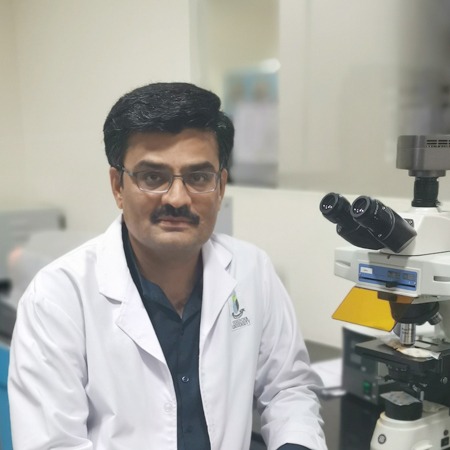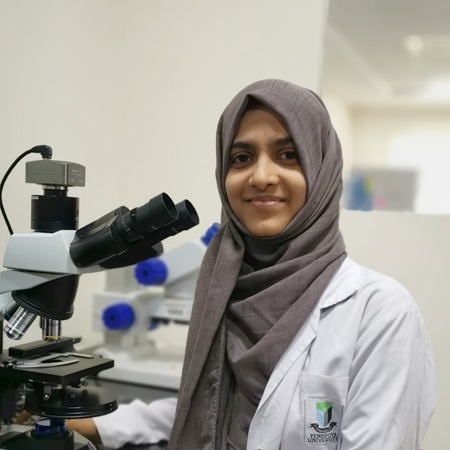
Dr. Arun A. B.
Professor and Principal (YIASCM)
-
PhD, Mangalore University, India
-
MSc, Mangalore University, India
-
bhagwatharun@hotmail.com , phyloarun@gmail.com; quality@yenepoya.edu.in
Arun A. Bhagwath, Ph.D is currently serving as a Professor of Yenepoya Research Center, Principal, Yenepoya Institute of Arts, Science, Commerce and Management (YIASCM) and Dean, Faculty of Science at Yenepoya (Deemed to be University), Mangaluru. In his current capacity, he manages, strategic thinking, planning, proposal preparations, SWOT analyses, critical process review, technology forecasting, communicating with global audience, securing deals, data management, handling legal proceedings, etc., Under his leadership, many new initiatives have begun and he was instrumental in the transformation of the Yenepoya (Deemed to be University) to a national institution of excellence.
Born in Padubidiri, Karnataka, India (26th November, 1974). He completed his primary and higher education in Karnataka, Ph.D from Mangalore University in the year 2002 from the Department of Biosciences. He was offered a Post Doctoral Fellowship from the Department of Soil and Environmental Sciences, National Chung Hsing University, Taiwan. In 2005, he was promoted as a Senior Researcher at the same Institute. During the year, 2009, he returned to India and joined Yenepoya (Deemed to be University, Mangalore), Mangalore to establish and head the Research Centre. He is currently, the Professor at this Research Centre. Additionally, he is also heading the Quality Assurance and Accreditation processes of the University as a Deputy Director. The Research Centres, established by him is now recognised for its globally acclaimed research output, patents and products in the areas of Health and Allied Sciences. Through the team of visionary leadership and strategic thinking, the University has been transformed into a centre for excellence in medical education and research in the country. The University was transformed to “A” category within 5 years and the University has secured 86th position in NIRF-2019 Govt. of India, among 1000 other Universities in the country. The University was also ranked in THE-IMPACT Rankings in the top 300-400 range globally, 17th position in India under the research category in SCIMAGO Institutional Rankings for Research, and very recently had secured BAND-A (within 6-25 rank) in the AIIRA Rankings of HRD, Govt. of India. He has more than 250 publications in the reputed scientific journals and conference proceedings of national and international repute, guided 8 students for their Ph.D and currently handling funded research project from National and International agencies (more than Rs. 12 Cr. Funding), and has at least 6 patents and technology transfers. He has established and currently handling incubation and Entrepreneurship facilities and several new centres in the emerging areas of Health and Allied sciences. He was instrumental in establishing the training centres of international repute, colorations and linkages with the highly ranked national and international institutes and industries. He has successfully guided 5 start-ups which are currently being incubated at the University. He has been a member of various task forces formed by the Government and private agencies, and professional bodies. Organised and attended several training programmes, and also represented and delivered key note addresses in National and International forums, the very recent being the part of UNSDG-Health Summit held at Geneva. He has received national and international awards for the outstanding work.
Experience
- Principal (Apr 2022-till date) – YIASCM, Yenepoya University, Mangalore, Karnataka, India.
- Deputy Director (Apr 2018-Mar 2022) – Quality, Assessments and Compliance Center, Yenepoya University, Mangalore, Karnataka, India.
- Professor and Deputy Director (Oct 2010-Apr 2018) – Yenepoya Research Center, Yenepoya University, Mangalore, Karnataka, India.
- Senior Scientific Officer (Oct 2009-Oct 2010) – Yenepoya Research Center, Yenepoya University, Mangalore, Karnataka, India.
- Scientific Officer (Apr-Oct 2009) – Yenepoya Research Center, Yenepoya University, Mangalore, Karnataka, India.
- Senior Researcher (Jul 2007-Jan 2009) – Studies on functional diversity and dynamics of microbial communities in soil with reference to their ecological role in agro-ecosystems: National Science Council of Taiwan. Department of Soil and Environmental Science, National Chung Hsing University, Taiwan.
- Post-Doctoral Fellow (Mar 2003-Jul 2007) – Diversity of Nitrogen fixing and Phosphate solubilizing bacteria from Taiwan. Project of National Science Council of Taiwan.Department of Soil and Environmental Science, National Chung Hsing University, Taiwan.
- Research Associate (Nov 2002-Feb 2003) – Baseline ecology of benthos and thermal tolerance of some selected aquatic invertebrate species and some microbes from Kaiga Environs, Karnataka: Board for Research in Nuclear Science, Government of India.
- Voluntary Participation (May 2000-Jun 2002) – Higher Education Link Programme, British Council, Chennai Conservation and Preservation of Environmental Resources of Coastal Karnataka for the Enhancement of Quality of Life.
- Junior Research Fellow (Jul 2000-Oct 2002) – Baseline ecology of benthos and thermal tolerance of some selected aquatic invertebrate species and some microbes from Kaiga Environs, Karnataka: Board for Research in Nuclear Science, Government of India.
- Research Assistant (Jul 1998-Jul 1999) – DOD-ICMAM project on critical habitats.
Awards/Honors
- Outstanding Researcher Award-2009, National Chung-Hsing University, Taiwan.
- Appreciation certificate for the significant contribution to National Chung-Hsing University, Taiwan, 2009.
- Reviewer for Several Science Citation Indexed National/International Journals.
- Publications in Science Direct TOP 25 Hottest Articles and in Top 10 cited with more than 1000 citations.
Research Interest/Area
Microbial Systematics, Microbiome and Human Diseases, Biotechnology,Nano-Biotechnology, Toxicology and Nutrition
Research
- A study on bacterial exopolysaccharides for reducing uranium induced nephrotoxicity in animal model
Uranium nephrotoxicity is a health concern that has few treatment options. Bacterial exopolysaccharides (EPS) possess multiple biological activities and hence are prospective candidates for treating uranium nephrotoxicity. In this regard, we have been assessing the ability of bacterial EPS to reduce uranium nephrotoxicity in vivo with following work plan. A total of 11 bacteria have been isolated from various sources. One of the isolates, Enterobacter sp.YG4 has been identified to produce a β-glucan with potential hydroxyl radical scavenging ability and total antioxidant capacity. Experiments with albino Wistar rat models have shown that, this EPS can reduce uranium induced nephrotoxicity. - Evaluation of the cellular mechanism of uranium induced nephrotoxicity in Swiss albino mice
Uranium (U) is a common heavy metal occurring in the environment which is a long-lived radioactive element. Kidney is the principal target for uranium induced toxicity with damage occurring principally to the proximal convoluted tubules. Our study aims to understand the cellular mechanism involved in Uranium induced nephrotoxicity in mice. The major objective is to investigate the effect of Uranyl nitrate on cell proliferation, Cell death in mouse kidney and to determine the role of key signalling molecules involved in Uranium induced nephrotoxicity. - Early Detection of Leptospirosis using Immuno-Carbon Nanotubes
The serological, microscopic and culture tests remain suboptimal for clinical use in diagnosing Leptospirosis and early detection. Both Single Walled and Multi-Walled Carbon Nanotubes (SWCNT & MWCNT) can be modified and conjugated to a bioactive molecule and biological species including carbohydrates, amino acids and peptides, nucleic acid, proteins for different biological applications. Hence, our aim is to develop Carbon Nanotubes based biosensor for detecting the presence of Leptospira in the patients. To make it convenient and easy, we will use fluorescent tagged secondary antibody will be used to make it visible under fluorescent microscope.
- YP Chen, PD Rekha, AB Arun, FT Shen, WA Lai, CC Young (2006). Phosphate solubilizing bacteria from subtropical soil and their tricalcium phosphate solubilizing abilities. Applied Soil Ecology 34 (1), 33-41 (1100 citations)
- Sangeetha, VP.,Rekha, PD., Arun, AB. Role of PI3K-Akt and MAPK signaling in Uranyl nitrate induced nephrotoxicity. Biological Trace Element Research.(In press). DOI: 10.1007/s12011-018-1505-9.
- Manzoor, M.A. P., Singh, B., Agrawal, A. K., Arun, A. B., Mujeeburahiman, M., Rekha, P. D. Morphological and micro-tomographic study on evolution of struvite in synthetic urine infected with bacteria and investigation of its pathological biomineralization. PLOS One. 2018 (in press).
- Priyanka P, Arun AB, Ashwini P, Rekha PD. Versatile properties of an exopolysaccharide R-PS18 produced by Rhizobium PRIM-18. Carbohydrate Polymers. 2015; 126: 215-21. SCI. 4.2
- Hameed, A., Arun, A. B., Ho, H.-P., Chang, C. M. J., Rekha, P. D., Lee, M.-R., Singh, S. and Young, C.-C (2011). Supercritical carbon dioxide micronization of Zeaxanthin from moderately thermophilic bacteria Muricaudalutaonensis CC-HSB-11T. Journal of Agricultural and Food Chemistry. 59(8); 4119-24. SCI-IF-4.1
Books/Book Chapters
- Supriya P., Sridhar K. R., Arun A.B (2019). Impact of Electron Beam Irradiation on the nutritional attributes of seeds of coastal sand dune wild legume In:Plant and Human Health, (Eds. M. Ozturk, K. R. Hakeem) Volume 2, Springer Nature Switzerland AG.
- Supriya P., Sridhar K. R., Arun A.B (2017). Improvement of nutritional attributes of Canavaliacathartica seeds by electron beam irradiation. In:Handbook of Food Engineering (Ed. Grumezescu A M., Holban A M.) Publisher: Elsevier, Oxford, P
- Priyanka P., Arun A.B., Rekha P. D (2014). Emerging therapeutic applications of bacterial exopolysaccharides. In: Biomaterial Applications-Micro to Nano Scales (Ed. Thomas S., Kalarikkal N., Weimin Y., Babu SS). Apple Academic Press Inc., USA. Pp…
- Khalid P., Hussain M. A., Rekha P. D., Suman V. B., Arun A. B (2012). Modification of Carbon Nanotubes for Bio-applications and Toxicity Evaluation. In: Nano Biomaterials (Ed. Rajendran, P. Prabu, P and Geckeler, K. E). Bloomsbury Publishing India Pvt. Ltd. 155-160.
- Rekha, P. D., Arun, A. B., and Young, C. C. 2009. Whole cell biosensors for detection of quorum sensing signal molecules in Gram negative bacteria. In. Biotechnology: Concepts and Applications. Eds. RavishankarRaiVittal, Rajeev Bhat. Narosa Publishing House, New Delhi, India. pp. 480.
PI
- ICMR Grant: Early Detection of Leptospirosis using Immuno-Carbon Nanotubes. (Cost: 21.25 Lakhs)
Co-PI
- BIRAC, SPARSH Grant (Cost: 250 Lakhs)
- BIRAC, DBT Grant: Establishment of MedTech Design and Rapid Prototyping Facility. (Cost: 475.85 Lakhs)
| Sl. No. | Title | Authors | Agency/Year |
| 1 | Process for enhancing bioactivity of Exopolysaccharide produced by Labrenziasp. PRIM 30 and its uses | Dr.Arun AB ,Dr.Rekha PD, Dr.Prianka P | Indian /201641003579 |
| 2 | Rapid composting | Young, C. C. and Others | Taiwan Patent, 2009 |
| 3 | Process for extraction of Exopolysaccharide and Carotenoids in Single Fermentation | Dr.Rekha P.D, Dr.Arun A.B, Dr.Prianka P | Indian/201741002382 |
| 4 | Method for Detection & Diagnosis of Oral Cancer in a Sample | Dr.Riaz Abdulla, Dr. Anwar Asif, Mr. Hafiz Johan, Dr.Sneha Pinto, Dr.Yeshwanth S, Dr.Rekha P.D, Dr.Arun A B, Mr.Farhaad Y | India, Australian and US 201741015794, 2018100578 |
| 5 | Electrochemical biosensor and method for diagnosing Leptospirosis | Dr. Sudhakaraprasad, Dr. Arun A. B. and Mrs. Sapna Kannan | India, 201941047489 |
| 6 | Thermal biosensor based diagnostic kit for Leptospirosis | Dr. Sudhakaraprasad, Dr. Arun A. B. and Mrs. Sapna Kannan | India, 2020410011481 |





